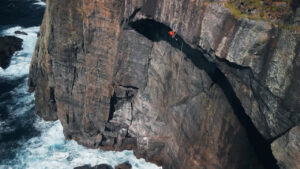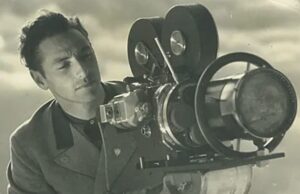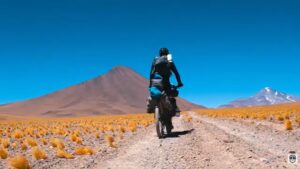This vintage BBC film from 1971 profiled Bill Houston, a simple Scotsman. Undeterred by the world’s fast-moving pace, Houston marched to his own slow rhythm. He was the kind of chap who would spend long afternoons clipping blooms in his garden.
For nine months of the year, he pushed rubbish through the local tip with a bulldozer. He rather enjoyed the job’s solitude. The rest of the time, Houston cycled cross-continent. He roamed the world this way for 25 years. He was one of the early long-distance cyclists who explored the world on two wheels. He pedaled through over 30 countries.
Houston owed his cycling lifestyle to Kirkpatrick Macmillian. The bicycle inventor was Houston’s idol and someone who shared a yearning for simple joys.
The freedom of the garbageman
Once Houston said of bulldozing rubbish, “I can look out the window. There’s no one pushing me. If I see something, I’ll go outside and have a look at it.”
Houston estimated that he covered more than 600,000km. “I’m a mechanized tramp,” he said of himself in the film.
“Tramp” referred to his travel style. He cycled with a stove, pot, and simple ingredients for meals. Then at dinner time, he propped his bike against less-frequented places like underpasses and heat up his food.
He was content to travel amid such simplicity and solitude. Once, he pedaled for 17 days without seeing another person. It was only after he began having conversations with his bike that he thought it was time to revisit civilization.
No more orders
Houston’s cross-continent cycling began after he left the army in 1946. Vowing never again to be ordered about, he first rode his way around Scotland and Ireland.
Winter in Scotland is too cold for camping, though. So Houston bought an old-fashioned Youth Hostel membership. With more than 90 “weekend cottages” across Scotland alone, Houston considered himself better off than a millionaire “because I don’t think a millionaire has 90 weekend cottages,” he said.
After three summers exploring Ireland by bike, he ventured further afield.
He pedaled through Lapland, the Sahara, Turkey, and Sardinia. In those years, such countries were less touristy than today. Yugoslavia, for example, had only recently introduced an open-door policy, allowing visitors. Now Yugoslavia doesn’t even exist. Hasn’t since 2003.
“Morocco was a good adventure,” recalled Houston. Arriving on a Friday, he stumbled upon a local feast. Sword-wielding men insisted that Houston devour a local delicacy, sheep’s eye. The Scotsman thought better than to object.
Vanished from view
Houston avoided main roads. He was a member of the Rough Stuff Fellowship, a gravel-biking, bikepacking association. In the early 1960s, he was also a founding member of Mountain Bothies, a voluntary association that maintained simple shelters in the wild countryside.
After BBC filmed Houston in 1971, his whereabouts became a mystery. An internet group searched for him ten years ago, intent on setting him up with a Wikipedia page. No one was able to find him, though. Presumably, he’s deceased now.






